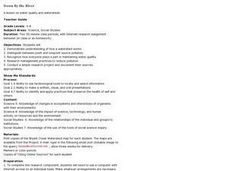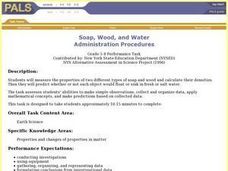Curated OER
Living During the Little Ice Age
Students brainstorm what living conditions during the period known as the Little Ice Age (1350-1850) might have been like. They research lifestyles, the economy, crop yields, and human and livestock mortality.
Curated OER
Where Have All the Glaciers Gone?
Fourth graders discover that scientists examine evidence from around the world in order to explain global climate change. They see that records of climate change exist, and describe photographs interpreting changes in glaciers over time.
Curated OER
Blooming Thermometers
Students study phenology, or the study of climate change. They research the Japanese springtime festival of Hanami and plot and interpret average cherry blossom bloom date data from the past 1100 years.
Curated OER
Down By the River
Students examine how watersheds work and determine the difference between point and nonpoint source pollution. They research management practices to reduce pollution and investigate how everyone can participate in reducing water pollution.
Curated OER
Predicting: Making a Hypothesis
Students analyze information from various sources to create a hypothesis about the origin of a family artifact. Students create a hypothesis about the origin of the item and write a paragraph explaining why they believe the hypothesis is...
Curated OER
Animal Research Project
Third graders prepare an oral report using Appleworks to present information on their animal. They write a short narrative comparing and contrasting their animal to another students and, after watching other presentations, discuss what...
Curated OER
Is There A Fungus Among Us?
Sixth graders classify fungus into two different groups. In this fungus lesson, 6th graders collect as many pieces of fungus as possible. Students then classify these pieces of fungus as saprophytic or parasitic.
Curated OER
"The Good, The Bad, and The Smelly."
Students explore insects' use of pheromones and beneficial insects versus insect pests.
Curated OER
Create a Non-native/Invasion Species
Students view a video about non-native/invasion species. They create a non-native/invasion species that they think would have an impact on farming, industry, recreation, or water in the local environment.
Curated OER
Watersheds, Watersheds Everywhere
Students identify the watershed in which their school is located. They use maps to locate their homes and school. They define and use the correct vocabulary.
Curated OER
Swinging
Students examine and modify a swinging apparatus. They describe the motion of an object by its position, direction of motion, and speed. Students measure motion using a graph.
Curated OER
Pendulum
Sixth graders are instructed on how to create a pendulum and measure the periodicity of the pendulum, using four different combinations of string. They are asked which influences the time more- the length of the string or the weight at...
Curated OER
Starch and Sugar Testing 1
Eighth graders determine the presence of starch and sugar in unknown solutions. This task assesses students' abilities to observe, record and interpret data, classify, generalize/infer, construct data tables, and identify sugar and...
Curated OER
Crustal Sinking
Students measure the rate of sinking of a test tube into a beaker of "glop", representing a model of the interaction between the Earth's crust and upper mantle. This task assesses students' abilities to make simple observations,...
Curated OER
Puddles and Soil
Students determine which of several soil samples (sand, soil, and slit) produces puddles, providing insight into the permeability of these different soils. This task assesses students' abilities to make simple observations, collect,...
Curated OER
Soap, Wood, and Water
Students measure the properties of two different types of soap and wood and calculate their densities. Then they predict whether or not whether or not each object would float or sink in fresh or salt water.
Alabama Learning Exchange
What Color Are The Leaves?
Young scholars identify the colors in leaves. In this chromatography lesson, students read the book Why Do Leaves Change Color? and construct chromatography strips to identify the colors of leaves.
Curated OER
How do protons stick together in a nucleus?
Students explain that the Standard Model of the atom includes particles beyond protons, neutrons, and electrons. They describe the nucleus as conglomeration of quarks that manifest themselves as protons and neutrons.
Curated OER
Do Dams Affect the Paddlefish Population?
Students study why dams are built and what is affected by them. They build model dams and explain how dams can be a detriment to paddlefish population.
Curated OER
Lab Safety
Students investigate the concept of lab safety using a variety of different activities. The equipment necessary is covered. They draw the different types of lab tools using a graphic organizer.
Curated OER
Density of Minerals
Students determine the mass, volume, and density of two different mineral samples. Students show data and calculations as well as answer questions about the mineral identities.
Curated OER
A Fiedl Study of an Integral Species
Young scholars compile baseline population information on a local species. They design and conduct a scientific investigation of a local species. Students interpret, analyze and communicate results based on sound scientific and...
Curated OER
Electricity: Series and Parallel Circuits
Fourth graders explore electricity and electrical circuits. They explore series and parallel circuits using Christmas lights. Students pull lights out of each strand of lights. They observe the results when the light bulb is pulled out....
Curated OER
Waves, Sound, and Light
Ninth graders explain waves in terms of energy transfer and describe their basic types and characteristics. They solve mathematical problems involving wavelength and frequency. Students conduct experiments in reflection and refraction.

























